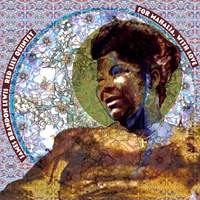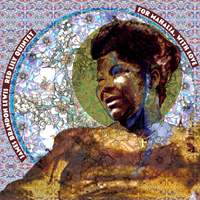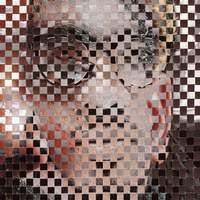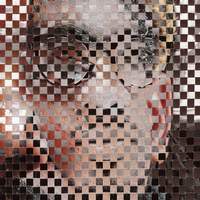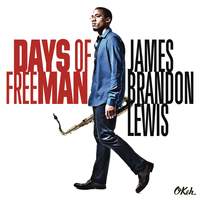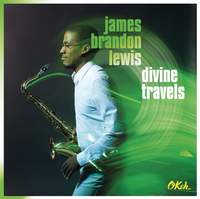Interview,
James Brandon Lewis for the Love of Gospel

James Brandon Lewis is a supremlely talented musician at the forefront of American jazz. A New York-based jazz tenor saxophonist, composer, and bandleader, his instrumental voice marries the emotional power of gospel and the grit and groove of blues and R&B to the modal and vanguard influences of Albert Ayler and John Coltrane, not to mention the expressive melodic and tonal discipline of Sonny Rollins. This year, he released two intriguing albums with contrastingly different lineups, concepts and sounds: Eye of I and For Mahalia, With Love, the second of which has found its way onto our shortlist of Jazz Recordings of the Year.
Read on to discover what James had to say about his inspiration behind these two projects before providing some personal insight behind his work's fruition...
Hi James, thanks for talking to us. I hear you’ve recently got back from travelling?
I just had a trio gig in Missouri, and then before that I was in Northern Africa serving as a mentor. A gentleman that I know, Federico Ughi, runs a label called 577 Records that also has a residency component to it where they invite applicants from all over the world to come and collaborate for a whole month, and they have different mentors every week: one week was me; this past week that just ended, Pat Thomas; this week, Leo Genovese will be there. I was in Tangier and it was great, you know, just mentoring, talking about improvisation and composition.
I suspect you were mentoring in not just a musical sense, but a spiritual one as well… What might we expect from your teaching methods?
I've been very much into quotes since I was a child. And so, we would start off with a quote, something to think about. It could be a musician, it could be anybody, but just something that just sparks some inquiry, and then we listened to music to get everybody on the page of where everyone's musical identity was.
It was nice to hear everyone's different influences, because it wasn't just me. It made it a collective situation. I would share a piece of music that we can listen to and that was the mornings. In the evenings, they would play and I would be a guide to some improvisational concepts and certain things to think about — not necessarily always technical, but definitely some philosophical things. And then, some spontaneous compositional things to think about. Then, at night, we would jam with the gnawa musicians, and that was really awesome for me.
You're about to embark on your latest European tour — how have you found your music to be received in this part of the world?

I've been touring in Europe for the last 10 years as a leader and it's been going great. It's just been getting better. It's really well received, you know, I mean it's interesting because I think I'm at a turning point where if you can reach one, you can reach many at this point (with the advantages of social media). I like that concept, even having grown up in the church, where sometimes you'd have a congregation of two or three people… the whole idea of ‘where two or three are gathered’ [Matthew 18:20]… bam! It's been encouraging, you know, Europe has been very supportive of my career and things have been improving slowly in America for me. I'm in a good place.
I’m struck by the contrasting nature of the two albums you've released this year, Eye of I and For Mahalia, With Love. Would you describe their function as different modes of self-expression?
I have a lot of ideas or different ways that I like to paint a story. I don't feel like one ensemble can serve multiple ideas, so I like the idea of working with different individuals. Every ensemble has a particular concept that I'm trying to explore. When I think about my trio, for instance, I'm thinking about young people in terms of the vibe, hip hop, rock, jazz, funk, soul… Even when you go back and listen to the albums since Days of Freeman, the trio’s identity has been a particular vibe and setting. When I started to use piano again, I felt like it was time to dip my hand in a previous popular format — the idea of bass, piano and drums — and explore that system of improvisation and composition.
And then with Red Lily Quintet, the idea of lineage and tribute, about the past (not beholden to it necessarily) but thinking about it from a folk sense, the idea of horns and strings and percussion giving it a particular sound power. With all the ensembles, there’s definitely some orchestration involved as to how I want each one to sound so their character and identity can be fully realised, sound-wise. It also gave me an opportunity, compositionally, to explore different textures and different musical personalities. It keeps me busy, you know — it keeps me on my toes.
How did your work with Red Lily come about and what made you decide to go about undertaking the project at this point in your career?
Well, first of all, I like the story of the lotus.
Years ago, I had a first iteration of this ensemble called Lotus. And it was me, Kirk Knuffke and Hank Roberts. Great players. We did a gig and I put it aside for a while because it wasn't quite the sound that I was looking for.
Initially, I actually wanted to collaborate with a kora player, but I couldn't find one. And so I was like, “Well, how do I create that orchestrally?” I thought about the bass and the cello giving me those kinds of string sounds, and then I thought about the idea of tribute. I was inspired by visual artist Jack Whitten and his whole Black Monolith series... you think about Miles Davis’ A Tribute to Jack Johnson or Jason Moran doing the same with James Reese Europe. These are not necessarily new ideas, but I wanted to tell stories related to my own life.
What turned your attention to the work of gospel singer, Mahalia Jackson?
As an adult, I start reflecting on my own stories, my childhood, my upbringing. I'm of an age now where I can peel back the layers even further than just that first initial experience with these people. So then, you fast forward to the idea of my grandmother's influence all my life — I featured her on Days of FreeMan, she narrates that album — I’m interested in intergenerational conversation. I've had a lot of conversations with my grandparents, they've had an influence on my life, and in talking with my grandmother about her musical influences because she sang in church and her stories about actually hearing Mahalia Jackson, it really had a profound effect on me.
I'm also interested in the role of encounter, this idea that you experience something and then that shapes your identity or your artistic DNA… If you think about Coltrane and his relationship with God and then from that relationship, the byproduct is the effects of that on his music or that which is a day to day situation. Charlie Parker having Joe Jones throw the symbol at him, what did that do for him in revealing something to him about himself?
Tell us about what you had to learn from your family?
My grandmother's 86. She was born in the thirties. That's a specific mind, a specific way of being and behaviour, socially and culturally. And so, I said, “Why not do a tribute?” I have been playing gospel music my whole life. I'm not an avid churchgoer. I was at a particular time in my life – my dad is a minister, I still believe in God – so I just thought, why not examine it. That's the through line with all of my albums. I think that Eye of I and For Mahalia, With Love, sonically they’re in different places but the context is similar. There’s a conversation between both; it’s just two different sounds, two different ways of being because we’re multifaceted. We’re not just one thing as individuals, we come from many things.
So the album’s spiritual undercurrents must relate to you on a personal level, then?

Sure. First, I want to say that I think that most — I won’t say all — but most of us as human beings, if we’re privileged to experience our grandparents, have a healthy reverence for them. It’s like grandma and grandpa can do no wrong, and so I think I never let go of this kind of love for wanting to know, well, what music did they listen to and what did they like? I really treasure those conversations. And then, growing up, going to church was not unique to me. When I think about the stories, all of my albums point toward a relationship with the creator, whether it's the titles or thoughts of introspection.
I can't play stories I haven't lived. I have a responsibility as an artist to speak on my lived experience. I grew up in church and went there every week. I was part of the youth group. I had a gospel instrumental band, piano and sax. So, I've always had a personal connection with church and the album. I mean, a lot of those songs I sang at church so I picked them, in particular. I guess it would have been innovative to feature more obscure Mahalia tunes but, for me, that wasn't the point; the point was to establish a through-line with myself and my grandmother.
I don't think I could play these songs if I picked them up just now. And, the fact that they're now on display for people to hear, hopefully the listener hears a personal relationship with the material I've played my whole life.
Have you gathered a sense of continuing traditions in gospel music and beyond?
There’s a rich fabric, at least within my family structure, of knowing from whence you came. It was a serious endeavour in my childhood, any time we spoke on the creator and on this music in my household. You gotta think, before Mahalia Jackson, there wasn’t a gospel music category — she created that! So, I've always felt a deeper sense that these songs, these compositions mean something that is greater than myself, but then that can get lost in translation; the day to day routine, the infinite loop. The moments when I felt like intuition/gut feeling/muse/spirit that shows up is a thing that a lot of us musicians are chasing: we’re chasing that thing that’s beyond ourselves. That feeling is elusive and that's why I play music, you know. I’m trying to get to that feeling every time, that otherworldly thing that ceases to be about notes, which are mere residue of what’s actually happening. It’s what we hope to capture.
I think the essence of it is like you're saying “I hope music shows up tonight!”, because you just never know. I wouldn't say I'm the most political or outspoken person, but I feel like music is my greatest medium; it says everything that I can't say.
When we talk about that place or thinking about something greater than ourselves, I think that's why we're drawn to certain artists and vibes. There's a bit of mystery there, but it's the same thing. I still got the same 12 notes they're playing with, they’re just organised differently.

What sort of feeling are you trying to express when you perform... Is it even tangible?
Well, you know what? What I think it is, is that...
It's being present. The only thing that you can somewhat control in music is being present, which has to do with focus and discipline. I'm not talking about being disciplined with the notes — I'm saying intention. Anytime I would hear any of these people that we call great, what I hear is the amount of intention. It's like a vacuum where everything just stops and is centred. That's why we keep getting on the bandstand: we don't know when that vibe is going to show up, but when it does, we know it... You feel it.
It's reverberating on such a level that you look at each other at the end of the gig and say, "Wow, that was beautiful." It's like when you hear a good piece of music. We have to remember that music is very much the conductor of how we feel. We listen to it and it's still such a beautiful thing that as much as they want to try to put it on a grid, it doesn't explain how it makes you feel. We're still trying to figure that piece out: why do certain frequencies make us feel a certain kind of way?
I don't know if that can be answered, other than playing with intention like it's your last time because then your body's going into fight or flight: “Okay, if this is the last time, how am I going to make it count? How do I want to be remembered?” And, for some people, that might be extreme, but I also don't take life for granted (as best I can). You might as well take risks. I think the bandstand is probably the extent of mine but, then again, I live in New York — there's a risk every time I go out my door!
Just to end with, I want to run past you this quote from Wayne Shorter, who famously said "Jazz means ‘I dare you'." What do you make of this statement?
People are gonna be repeating that until they decide what else resonates with them. I think it’s more about the application, it’s what you do. We can listen to these quotes, but what part of the quote are we going to actually apply to our own lives? What does that actually mean, ‘I dare you’?
What are we doing? Are we just saying that on autopilot, over and over again? Or, are we going to take the time out to really invest in what it means? Does ‘I dare you’ mean that we continue to play the forms over and over again? Or does it mean that we stretch the forms, that we're no longer gonna live under the moniker that there's nothing new under the sun, or that we’re now gonna go beyond it?
I think anything that can spark thought is healthy, but then you have to apply that thought to application — you can't just live with platitudes and cliches to make you feel better like you came up with it yourself! After the cliche, the instrument’s looking up at you. Wayne can say that, but he already put in enough work. That's the missing link. I think that's something not to compare but to be inspired by. If you think about time as being unfixed, then you realise that this is a life's work and that it will live on past your own fixed point on the grid.

James Brandon Lewis' For Mahalia, With Love is nominated for our Recording of the Year, due to be announced on Thursday 7th December. You can find the complete shortlist of nominees here!



